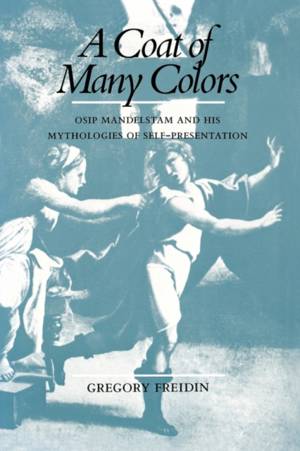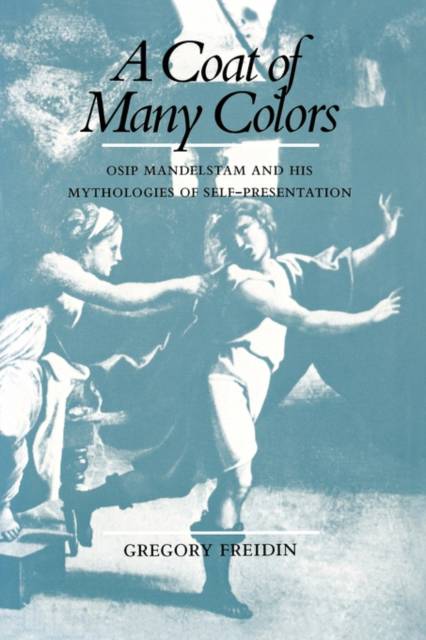
- Afhalen na 1 uur in een winkel met voorraad
- Gratis thuislevering in België vanaf € 30
- Ruim aanbod met 7 miljoen producten
- Afhalen na 1 uur in een winkel met voorraad
- Gratis thuislevering in België vanaf € 30
- Ruim aanbod met 7 miljoen producten
Zoeken
A Coat of Many Colors
Osip Mandelstam and His Mythologies of Self-Presentation
Gregory Freidin
Paperback | Engels
€ 62,95
+ 125 punten
Omschrijving
For the major poets of Osip Mandelstam's generation, poetry represented a calling in the most tangible sense. To respond to it meant to fashion from the available cultural and personal material a mythic self, one that could serve both as the organizing subject for poetry and as an object of worshipful adoration. A successful poet like Mandelstam thus became the focal point of a complex cultural phenomenon-perhaps a charismatic cult-that shaped his writings, gesture, and reception.
Gregory Freidin examines Mandelstam's legacy in this broader context and lays the groundwork for approaching modernist Russian poetry as a charismatic institution. He traces the interplay of poetic tradition, personal background, historical events, religious culture, and political developments as they entered the symbolic order of Mandelstam's art and helped determine its outlines in the reader's imagination. Many important aspects of the Mandelstam phenomenon, including the Jewish theme, the meaning of the poet's Christianity, his political stand, and, in particular, his conflict with Stalin and Stalinism, receive here a new interpretation.
A case study in the emergence of a literary cult, A Coat of Many Colors reveals how Russian poetry of the early twentieth century functioned as a charismatic institution of a distinctly modern kind. Those who belonged to it combined knowledge of the recent studies in myth, magic, and religion with the cultivation of verbal magic, mythic consciousness, and unorthodox religious beliefs. Following Mandelstam's career over its entire span (1908-1938), Freidin shows how the poet benefited from literary scholarship, comparative mythology, the history and sociology of religion at the same time he was emulating in his poetry the very subject of these academic disciplines. To account for this duality in interpreting Mandelstam's writings, Freidin draws on explanatory paradigms of contemporary human sciences, from Saussure and the Formalists to Weber, Durkheim, Freud, and Marcel Mauss.
Gregory Freidin examines Mandelstam's legacy in this broader context and lays the groundwork for approaching modernist Russian poetry as a charismatic institution. He traces the interplay of poetic tradition, personal background, historical events, religious culture, and political developments as they entered the symbolic order of Mandelstam's art and helped determine its outlines in the reader's imagination. Many important aspects of the Mandelstam phenomenon, including the Jewish theme, the meaning of the poet's Christianity, his political stand, and, in particular, his conflict with Stalin and Stalinism, receive here a new interpretation.
A case study in the emergence of a literary cult, A Coat of Many Colors reveals how Russian poetry of the early twentieth century functioned as a charismatic institution of a distinctly modern kind. Those who belonged to it combined knowledge of the recent studies in myth, magic, and religion with the cultivation of verbal magic, mythic consciousness, and unorthodox religious beliefs. Following Mandelstam's career over its entire span (1908-1938), Freidin shows how the poet benefited from literary scholarship, comparative mythology, the history and sociology of religion at the same time he was emulating in his poetry the very subject of these academic disciplines. To account for this duality in interpreting Mandelstam's writings, Freidin draws on explanatory paradigms of contemporary human sciences, from Saussure and the Formalists to Weber, Durkheim, Freud, and Marcel Mauss.
Specificaties
Betrokkenen
- Auteur(s):
- Uitgeverij:
Inhoud
- Aantal bladzijden:
- 450
- Taal:
- Engels
Eigenschappen
- Productcode (EAN):
- 9780520269163
- Verschijningsdatum:
- 13/05/2010
- Uitvoering:
- Paperback
- Formaat:
- Trade paperback (VS)
- Afmetingen:
- 152 mm x 229 mm
- Gewicht:
- 653 g

Alleen bij Standaard Boekhandel
+ 125 punten op je klantenkaart van Standaard Boekhandel
Beoordelingen
We publiceren alleen reviews die voldoen aan de voorwaarden voor reviews. Bekijk onze voorwaarden voor reviews.











